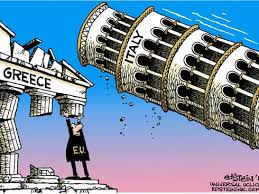 August 7, 2012 – ITALY - Italy's economy shrank 0.7% in the second quarter, underlining a deepening recession, as government austerity measures continue to affect everything from factory activity to consumer spending. Italy's GDP fell for the fourth quarter in a row, preliminary figures showed. Compared with a year earlier, growth slumped by 2.5%, Istat said. GDP fell by 0.8% in the first quarter compared with the final three months of 2011, the statistical agency said. Earlier, data showed that factory output in June slumped 1.4% compared to May and 8.2% year on year. Prime Minister Mario Monti's government is implementing a series of austerity measures worth 20bn euros (£15.8bn) as it grapples with rising borrowing costs, driven by market fears over the widening eurozone sovereign debt crisis. But investors are worried Italy may be next in line to suffer the same ordeals that have hit Greece, Portugal and now Spain. Italy's government has the biggest debt burden of any of the major eurozone countries at 123% of GDP, which makes it particularly susceptible to a loss of market confidence - something that would make it impossible for the government to roll over its debts as they come due for payment. Italian business confidence fell last month, as company executives are increasingly pessimistic over the country's economic prospects and expect the recession to worsen in coming months. Employers' lobby group Confindustria predicts that the economy will shrink 2.4% this year, with unemployment hovering around 11%. Mr Monti has been trying to persuade other European leaders to give Italy some breathing space to allow its economy to grow, rather than sticking to tight fiscal targets that have contributed to the recession's deepening. –BBC August 7, 2012 – ITALY - Italy's economy shrank 0.7% in the second quarter, underlining a deepening recession, as government austerity measures continue to affect everything from factory activity to consumer spending. Italy's GDP fell for the fourth quarter in a row, preliminary figures showed. Compared with a year earlier, growth slumped by 2.5%, Istat said. GDP fell by 0.8% in the first quarter compared with the final three months of 2011, the statistical agency said. Earlier, data showed that factory output in June slumped 1.4% compared to May and 8.2% year on year. Prime Minister Mario Monti's government is implementing a series of austerity measures worth 20bn euros (£15.8bn) as it grapples with rising borrowing costs, driven by market fears over the widening eurozone sovereign debt crisis. But investors are worried Italy may be next in line to suffer the same ordeals that have hit Greece, Portugal and now Spain. Italy's government has the biggest debt burden of any of the major eurozone countries at 123% of GDP, which makes it particularly susceptible to a loss of market confidence - something that would make it impossible for the government to roll over its debts as they come due for payment. Italian business confidence fell last month, as company executives are increasingly pessimistic over the country's economic prospects and expect the recession to worsen in coming months. Employers' lobby group Confindustria predicts that the economy will shrink 2.4% this year, with unemployment hovering around 11%. Mr Monti has been trying to persuade other European leaders to give Italy some breathing space to allow its economy to grow, rather than sticking to tight fiscal targets that have contributed to the recession's deepening. –BBC
|
Nessun commento:
Posta un commento